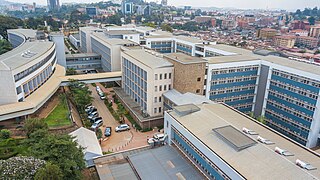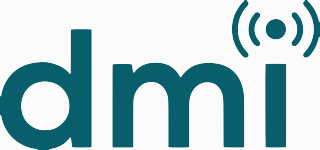Omidyar Network is a self-styled "philanthropic investment firm," composed of a foundation and an impact investment firm. Established in 2004 by eBay founder Pierre Omidyar and his wife Pam, Omidyar Network has committed over US$1.5 billion to nonprofit organizations and for-profit companies across multiple investment areas. According to the OECD, Omidyar Network's financing for 2019 development increased by 10% to US$58.9 million.

A charitable organization or charity is an organization whose primary objectives are philanthropy and social well-being.

Mulago National Specialised Hospital, also known as Mulago National Referral Hospital, is a component of Mulago Hospital Complex, the teaching facility of Makerere University College of Health Sciences. It is the largest public hospital in Uganda.
Mulago is a hill in north-central Kampala, the capital city of Uganda. The hill rises 4,134 feet (1,260 m) above sea level. The name also applies to the neighborhoods that sit on this hill.
Innovations for Poverty Action (IPA) is an American non-profit research and policy organization founded in 2002 by economist Dean Karlan. Since its foundation, IPA has worked with over 400 leading academics to conduct over 900 evaluations in 52 countries. The organization also manages the Poverty Probability Index.
As of 2021, 11 universities in Uganda offer medical schools. Admission to medical school requires the candidate to have attained a Uganda Advanced Certificate of Education (UACE) as well as proficiency in Biology or Zoology, Chemistry and Physics at A-level standards. Training leading to the degree of Bachelor of Medicine and Bachelor of Surgery (MBChB) lasts five years. Major examinations are conducted after the first, second and fifth year, with additional evaluations after each clinical rotation. After successful completion of the fifth year, candidates complete a year of internship under the supervision of specialists. Postgraduate training is available at Makerere University School of Medicine and other Public and Private Universities in a number of medical and surgical disciplines. The training takes three to four years and leads to the Master of Medicine (MMed) degree. The East, Central and Southern Africa College of Health Sciences is nowadays another alternative postgraduate training pathway in Uganda, such as Membership [MCS (ECSA)] and Fellowship [FCS (ECSA)] of the College of Surgeons of East, Central and Southern Africa (COSECSA); as well as in Internal Medicine through the East, Central and Southern Africa College of Physicians (ECSACOP) and the College of Obstetrics and Gynecology of East, Central and Southern Africa (ECSACOG) for Obstetricians and Gynecologists.
VillageReach is a registered 501(c)(3) that works with governments to solve health care delivery challenges in low-resource communities. It is headquartered in Seattle, Washington, in the United States, with offices in various countries including Mozambique, Malawi, and the Democratic Republic of the Congo, Africa. The VillageReach approach includes developing, testing, implementing, and scaling new systems, technologies and programs that improve health outcomes. This is achieved by extending the reach and enhancing the quality of health care. The benefits are manifested through supply chain and logistics improvements, information and communication technology, human resources for health, private sector engagement, and advocacy.

mothers2mothers is an international nonprofit organization dedicated to preventing mother-to-child transmission of HIV by providing education and support for pregnant women and new mothers living with HIV.
Good Ventures is a private foundation and philanthropic organization in San Francisco, and the fifth largest foundation in Silicon Valley. It was co-founded by Cari Tuna, a former Wall Street Journal reporter, and her husband Dustin Moskovitz, one of the co-founders of Facebook. Good Ventures adheres to principles of Effective Altruism and aims to spend most or all of its money before Moskovitz and Tuna die. Good Ventures does not have any full-time staff, and instead distributes grants according to recommendations from Open Philanthropy.
The Mulago Foundation is a private foundation focused on high impact philanthropy: investing in charities and philanthropic opportunities that have the highest impact. The foundation was originally envisioned by Rainer Arnhold, a San Francisco pediatrician and philanthropist, who taught at Mulago Hospital, Uganda. The foundation was officially created by his brother Henry Arnhold after Rainer Arnhold's death in 1993.
Jasmine Social Investments is a New Zealand-based private foundation started by the entrepreneur Sam Morgan in 2006 following the sale of his company Trade Me to Fairfax Media.
The Peery Foundation is a private foundation based in Palo Alto, California, US. According to its website, it "primarily invests in early to mid-stage social entrepreneurs who are effectively addressing the issues of poverty." It funds local organizations in the Bay Area as well as organizations working to combat poverty and its ill-effects worldwide.
Root Capital is a nonprofit organization operating in poor rural areas of Africa, Latin America, and Southeast Asia. According to its website, Root Capital "seeks to maximize the positive social and environmental impact of [its] work through a three-pronged strategy: finance, advise, and catalyze."

The AIDS Support Organization (TASO) is an indigenous HIV and AIDS service initiative, registered in Uganda as a non-governmental organisation. It is a pioneer non-public actor in the HIV and AIDS response in Uganda. TASO is a membership organisation with over 4,000 subscriber members.
The Infectious Diseases Institute (IDI), established within Makerere University, is a Ugandan not-for-profit organization which aims to strengthen health systems in Africa, with a strong emphasis on infectious diseases; through research and capacity development. In pursuit of its mission both in Uganda and Sub-Saharan Africa, IDI provides care to People Living with HIV (PLHIV) and other infectious diseases, builds capacity among healthcare workers through training and ongoing support, maintains a focus on prevention, and carries out relevant research.
Started in 2002, Draper Richards Kaplan Foundation is a global venture philanthropy firm supporting social enterprises.

Development Media International (DMI) is a non-governmental organization with both non-profit and for-profit arms that "use[s] scientific modelling combined with mass media campaigns in order to save the greatest number of lives in the most cost-effective way".
Uganda Heart Institute (UHI), is a specialized, public, tertiary care medical facility owned by the Uganda Ministry of Health. It is a component of Mulago National Referral Hospital, the largest hospital in Uganda, which serves as the teaching hospital of Makerere University College of Health Sciences.
Muso is a 501(c)(3) global health organization based in Mali. Created in 2005, by a group of Malian and American collaborators, including the following still active team leaders Dr. Djoumé Diakité, Moise Samaké, Dr. Jessica Beckerman, and Dr. Ari Johnson, of San Francisco General Hospital. Muso has developed a proactive Community Case Management (Pro-CCM) healthcare delivery model, intended to reduce child mortality and improve early access to care.
ImpactMatters was an American charity assessment organization that evaluates the impact of charitable organizations.





